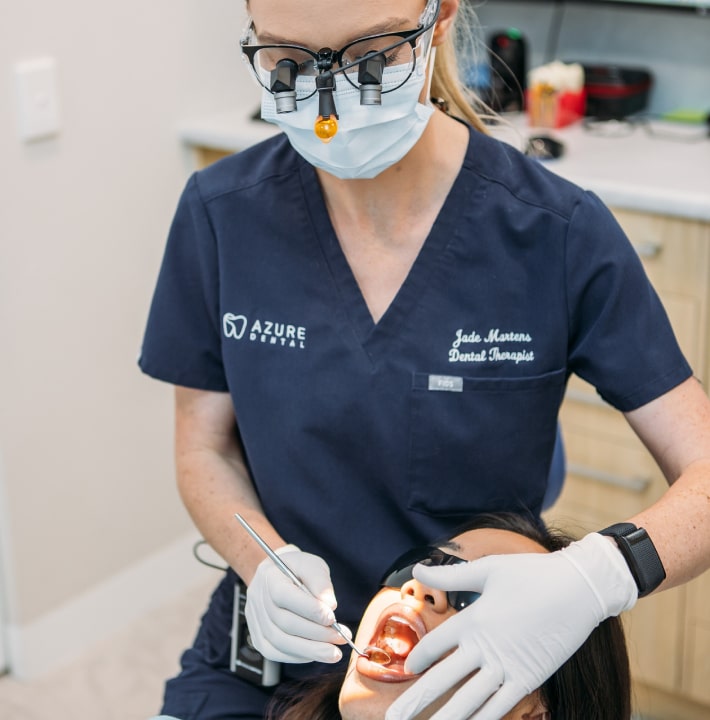Achieve A Confident Smile With Dental Implants
Why I Got Dental Implants
Former WA Premier Brian Burke's Journey at Azure Dental

Dental Implants: How They Function, Enhance Smiles, And Improve Oral Health
Losing teeth not only impairs chewing and speech but also triggers jawbone degradation, leading to significant changes in facial structure and overall dental health. This can diminish confidence and comfort, making everyday interactions and activities more challenging.
Dental implants provide a practical option by anchoring to the jawbone, offering a stable base for artificial teeth that perform like natural ones. This approach not only restores functionality but also helps preserve the facial structure, improving oral health and physical appearance sustainably.

What Makes Someone A Good Candidate For Dental Implants
Dental implants are an effective option for people looking to replace missing teeth, but certain factors determine eligibility. Let’s explore the characteristics that make someone an ideal candidate for implants:
- Adequate jawbone density is critical to support the implant securely and promote proper healing.
- Good overall oral health, free from gum disease or significant decay, is important for successful implantation.
- Ideal candidates should be non-smokers or those willing to quit smoking, as smoking can hinder healing.
- Candidates should be in generally good health, as certain medical conditions or medications may affect recovery and the implant’s success.
Understanding The Benefits Of Dental Implants For Long-Term Oral Health
Dental implants contribute significantly to maintaining oral health over time. To better understand their impact, let’s look at the benefits they provide for improving both functionality and overall dental health:
- Dental implants help prevent bone loss by stimulating the jawbone, reducing the risk of bone deterioration after tooth loss.
- Implants provide stability and support for chewing, allowing patients to eat a wide range of foods without discomfort.
- They offer a natural look and feel, blending with your existing natural teeth.
- With proper care, dental implants can function well for many years, making them a durable option for tooth replacement.

Dental Implant Services
Explore various dental implants in Perth, which are designed to enhance function and aesthetics with the latest in implant technology.
What To Expect During The Dental Implants Consultation Process
Comprehensive Oral Health Assessment
During the first part of the consultation, the dentist thoroughly examines your mouth to assess teeth, gums, and oral health. They identify conditions that could impact the success of the implant, such as gum disease. The dentist also evaluates your jawbone's strength to see if it can support the implant.
Detailed Medical History Review
Next, your dentist reviews your medical history, including medications and chronic conditions. This helps identify factors that could influence healing or increase the risk of complications during the implant procedure. The review allows the dentist to adjust the treatment plan to match your specific health needs for a safe experience.
Diagnostic Imaging and Scans
During this step, advanced imaging tools like X-rays or CT scans are used to get a detailed view of your jaw and surrounding structures. These images help pinpoint the ideal placement for the dental implant. Additionally, the scans detect any bone loss or other issues that might affect the procedure.
Personalised Treatment Plan Discussion
At this point, the dentist will go over your diagnostic results and explain a personalised treatment plan based on your specific oral health. You'll learn the steps of the implant process, including the timeline. Any concerns you have will be addressed so you understand what lies ahead.
Questions and Concerns Addressed
In the final step, the dentist allows you to ask any remaining questions about the procedure, recovery, or long-term care. This is your chance to clarify concerns and receive detailed answers. The dentist wants you to leave the consultation feeling informed and confident about your upcoming dental implant journey.
Pricing Guide
Explore our dental implant pricing guide for a clear understanding of the costs associated with our range of implant options.
Single Implants
Starts at
$6,500 AUD
- Single implants replace one missing tooth without altering or depending on adjacent teeth, making it a standalone restoration.
- They prevent the remaining teeth from shifting into the gap, maintaining proper bite function and oral stability.
- Single implants are designed to function like natural teeth, offering long-term durability and comfort while improving daily oral activities such as chewing and speaking.
All-on-4 Implants
Starts at
$27,500 AUD
- Requires fewer implants than traditional methods, making it less invasive and reducing recovery time compared to placing each implant.
- Provides immediate function, allowing patients to eat, speak, and smile confidently soon after the procedure.
- Minimises or eliminates the need for bone grafting by strategically placing implants in areas of high bone density, even for those with significant bone loss.
Implant-Retained Dentures
Starts at
$18,000 AUD
- Implant-retained dentures offer enhanced stability compared to traditional dentures, providing a secure fit that improves chewing and speaking ability.
- Each piece combines elegance and strength for a long-lasting finish.
- This option helps preserve the jawbone by stimulating it with implants, reducing bone loss commonly associated with traditional dentures and maintaining facial structure.
Schedule Your Consultation Today
Experience Exceptional Dental Treatments for a Healthier, Brighter Smile

Frequently Asked Questions
What is the process for getting dental implants?
If you’re considering tooth implants, it’s important to know what the procedure entails from start to finish. Here’s an in-depth look at each step involved in the dental implant process.
- Initial consultation:
At this first appointment, your dental history is reviewed. A full oral examination is also conducted to determine if implants are suitable for you. - Dental imaging:
X-rays or CT scans are then taken to assess your jawbone and map out the implant placement. - Treatment planning:
Based on your scans, a detailed treatment plan is crafted, specifying where and how the implants will be placed. - Tooth extraction (if necessary):
Any teeth where the implant will be placed are extracted to make room for the new implants. - Jaw preparation (if required):
If your jawbone isn’t thick enough for implants, a bone graft may be done to enhance its strength. - Implant placement:
The implants are surgically placed into your jawbone; this procedure is done under local anaesthesia. - Healing period:
There’s a waiting period to allow your jawbone to heal and grow around the implant, securing it in place. - Abutment placement:
After bone healing, the abutment is installed on the implant to hold the artificial tooth. - Dental prosthesis fitting:
The final step is attaching and adjusting the replacement teeth or custom crown to the abutment for a natural appearance and fit.
The entire dental implant procedure is meticulously planned to allow your new teeth to function effectively like natural ones. At Azure Dental, our dental team’s commitment to precision and dental care supports you in achieving a comfortable transition to an enhanced appearance.
Is dental implant surgery painful?
No, dental implant surgery should not be painful. The procedure is performed under local anaesthesia, which numbs the surgical area to block discomfort. Additionally, for those particularly anxious about dental procedures, options for sedation and sleep dentistry are available. These methods provide a relaxed dental experience, allowing anxious patients to undergo the dental implant procedure comfortably.
How long does it take to recover from dental implant surgery?
Recovery from dental implant surgery involves several key phases, each vital for the successful integration of the implant:
- Initial healing phase:
This stage lasts for about one to two weeks, during which time post-surgical symptoms such as discomfort and swelling decrease. - Osseointegration phase:
This period, lasting three to six months, allows the implant to fully attach to the jawbone, creating a solid base for teeth replacement.
Understanding these phases helps in managing expectations and preparing for the recovery process.
How long do dental implants last?
With proper care, dental implants can last for many years. The crown, bridge, or denture connected to the implant usually lasts between 5 and 15 years. The dental implant post itself can last for about 20 years. The lifespan of dental implants largely depends on maintaining good oral hygiene practices and attending regular dental check-ups.
Will my dental implants look and feel like natural teeth?
Yes, your dental implants will look and function just like natural teeth. They are specifically designed to match the appearance and performance of your real teeth. They are anchored securely into your jawbone, providing stability that feels like your own teeth. This secure fit allows you to speak and eat comfortably. The crowns attached to the implants are matched in colour and shape to blend well with your existing teeth, enhancing the natural appearance.
Can dental implants be used to replace multiple missing teeth?
Yes, dental implants can replace several missing teeth when there is significant tooth loss. This method is known as an “implant-supported bridge” or “implant-retained denture.” Dentists use a few implants to anchor a bridge or denture, avoiding the need for one implant per missing tooth. This technique provides stability, as the implants act as strong support, similar to natural tooth roots. By spreading pressure across the jawbone, it maintains bone structure and prevents bone loss.
How much do dental implants cost?
Our dental implants in Perth can cost from $2,800. However, the final cost may vary due to several factors that can increase the base price. Here’s an overview:
- Number of implants:
More titanium implants increase the overall cost as each implant requires materials and surgical placement. - Bone grafting:
If the jawbone lacks sufficient density, a bone graft is necessary, adding to the complexity of treatment and the total cost. - Type of implant:
Different implant materials and brands vary in price, with some offering advanced features or longevity. - Additional procedures:
Preparatory dental treatments like extractions or sinus lifts may be required, increasing the total expense.
The dental implant costs reflect the personalised nature of the treatment and the long-term benefits of dental implants. At Azure Dental, discussing these factors during your detailed consultation helps provide a more accurate estimate tailored to your needs.
Are dental implants covered by health funds?
Yes, the dental implant procedure may be partially covered by health funds, but the amount of cover for this dental service varies. Most health funds provide benefits for general dental procedures, but implants fall under major dental cover.
Since dental implants involve surgical and restorative phases, funds often classify them differently. Your specific health fund policy, annual limits, and waiting periods will affect the available inclusion. It’s important to contact your health fund provider to understand the exact benefits of dental implants.
What are the risks or complications associated with dental implants?
Although there are numerous benefits of dental implants, they also come with several risks and complications that actual patients should understand. Here’s a detailed breakdown of each and how they can occur:
- Infection:
An infection may develop at the implant site, leading to dental pain, swelling, and discomfort. This happens if bacteria enter the surgical site or you do not maintain proper oral hygiene afterwards. - Nerve damage:
Nerve injury can cause numbness, tingling, or acute pain in the lips, chin, or tongue. This can happen if the implant is positioned too close to a nerve in the lower jaw. - Sinus issues:
In cases where implants are placed in the upper jaw, they may extend into the sinus cavity. This happens if there is insufficient bone height, potentially causing sinus infections or discomfort. - Peri-implantitis:
This is inflammation around the implant, similar to advanced gum disease. It can arise due to poor oral hygiene, which leads to bacteria buildup around the implant or from excessive biting forces. - Bone loss:
The bone surrounding the implant can deteriorate over time, which weakens support for the implant. This can occur if the implant fails to stimulate the jawbone effectively or if oral health is not maintained.
Recognising these risks helps patients understand the importance of thorough post-surgical care. Consistent oral hygiene and routine dental check-ups can greatly minimise the likelihood of these complications occurring.
Can I get dental implants if I have bone loss in my jaw?
Yes, you can still receive implants even if there is bone loss in your jaw. Experienced dentists often perform bone grafting, where artificial bone material is added to the jaw to build up its density and volume. This creates a stable foundation for the implant to anchor into the jawbone securely.
Depending on the extent of bone loss, bone grafting can be performed before or during the dental implant placement. Sinus lifts and other advanced techniques for managing upper jaw bone loss also help make dental implants possible in these cases.
How do I care for my dental implants after the procedure?
Caring for your dental implants after the procedure is essential for long-term success and oral health. Here are the steps you should follow for proper care:
- Maintain oral hygiene:
Brush your teeth twice a day using a soft-bristled toothbrush to avoid irritating the implant site. Use a low-abrasive toothpaste, and thoroughly clean around the implant to prevent plaque buildup. - Floss daily:
Flossing helps clear food particles and plaque from areas that brushing cannot reach. Use implant-friendly floss or interdental brushes designed for cleaning around implants. - Use an antibacterial mouthwash:
Rinse with an antibacterial mouthwash to reduce bacteria and prevent infection around the implant, especially during the healing period. - Avoid hard foods:
Refrain from biting into hard foods like ice or candy, as this can stress the implant site. Opt for softer foods during the initial healing phase. - Attend regular dental check-ups:
Schedule appointments with your dentist to monitor your dental implants’ health. Dentists can clean around the implants and address any issues early. - Avoid smoking:
Smoking can slow down healing and increase the risk of implant failure. If possible, avoid smoking, especially during recovery.
Following these steps supports the health and longevity of your dental implants. Consistent oral health care helps protect your investment and maintain a healthy, radiant smile.
Can I eat normally with dental implants?
Yes, you can eat normally with dental implants. Once the healing phase is complete, these high-quality dental implants function like natural teeth, allowing you to chew comfortably.
During the initial healing period, you may need to stick to softer foods to avoid stressing the implant site. After this phase, you can gradually reintroduce a variety of foods into your diet, including crunchy or chewy items. Dental implants provide stability, so you won’t have to worry about movement while eating. This allows you to enjoy your favourite meals with confidence.
What should I expect during a dental implant consultation?
During a dental implant consultation, the dentist will thoroughly evaluate your oral health and discuss the implant process. Here’s what you can expect during this appointment:
- Dental examination:
The dentist will examine your teeth, gums, and jawbone to assess overall oral health and implant suitability. - Dental imaging:
X-rays or CT scans are taken to check jawbone density, which is important for planning the implant placement. - Medical history review:
Your medical history, including medications and health conditions, will be discussed to identify any factors affecting the procedure. - Treatment planning:
The dentist will explain a personalised treatment plan, outlining the number of implants needed and the procedure timeline. - Cost and financing discussion:
A breakdown of the potential costs is provided, including factors that could influence the final price of the entire treatment. - Q&A session:
You can ask questions and address concerns about the procedure, recovery, and long-term comprehensive care for dental implants.
This consultation with our experienced team helps you understand the implant process and the necessary steps for successful treatment. It provides you with a clear plan tailored to your personal oral health needs and goals.
How do I prepare for dental implant surgery?
Preparing for dental implant surgery involves several important steps to make the procedure and recovery smoother. Here’s what you should do before your dental implant surgery:
- Discuss your medications:
Inform your dentist about your medications, including prescriptions, over-the-counter drugs, and supplements. This is necessary to avoid any interactions or complications during the surgical procedure. - Avoid smoking:
Avoid smoking for at least a few weeks before your surgery, as it can slow down healing and increase the risk of implant failure. - Arrange transportation:
Make arrangements for someone to drive you to and from the clinic, as sedation or anaesthesia might affect your ability to drive safely. - Stock up on soft foods:
Have soft foods available at home after the surgery. This will make eating easier during the initial healing phase. - Follow pre-surgery instructions:
Follow any instructions provided by your dentist, like fasting before the procedure if any dental sedation option is used. - Wear comfortable clothing:
On surgery day, wear loose, comfortable clothing. This will help you relax during the procedure and make recovery smoother.
Proper preparation helps reduce stress and allows for a smoother recovery experience. Taking these steps beforehand prepares you for a more comfortable and successful implant experience.
Are there any age restrictions for getting dental implants?
No, there are no specific age restrictions for getting dental implants. However, candidates need to meet certain dental conditions for the procedure to be successful.
For younger patients, the jawbone must be fully developed before implants can be placed. This usually happens in the late teenage years, around 18 to 20. For older adults, high-quality dental implants are still a viable option as long as their overall health and bone density are adequate. Your dentist will assess various factors to determine suitability for implant treatment regardless of age.



